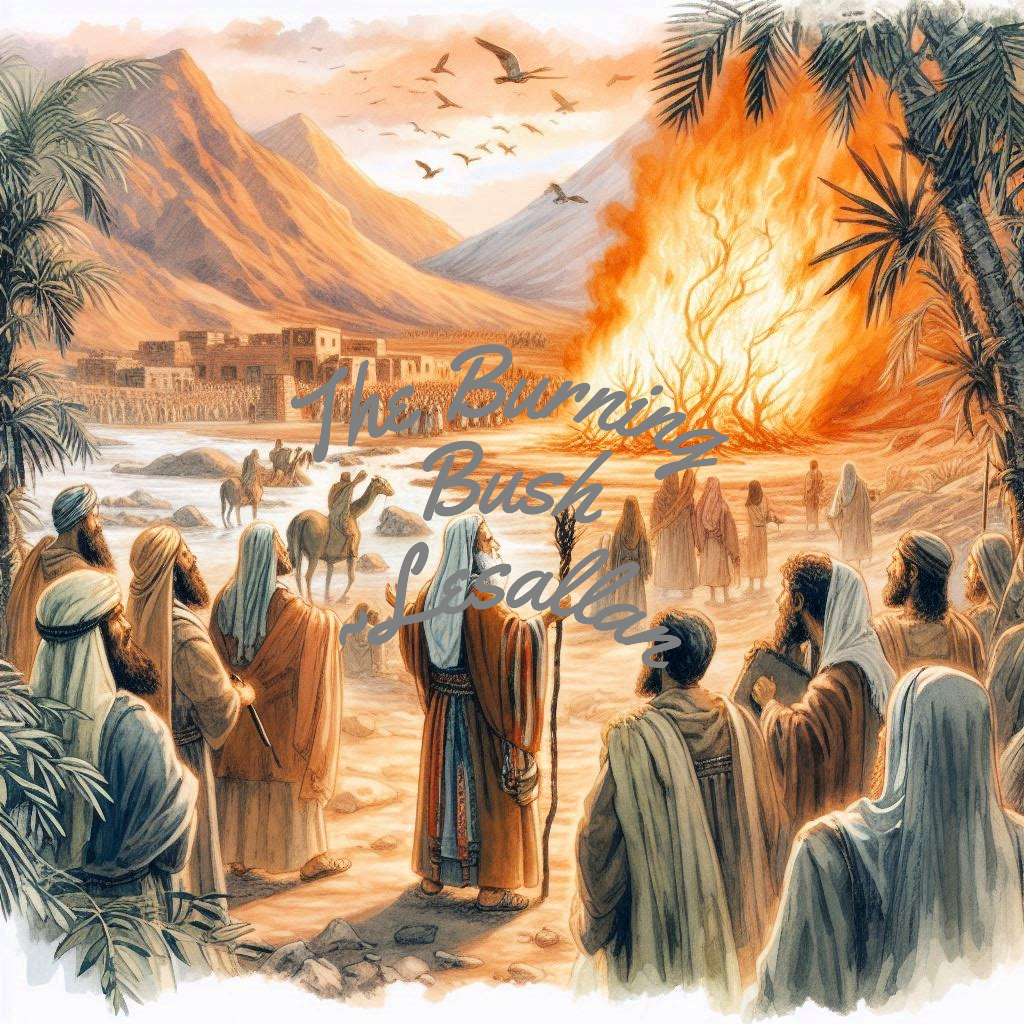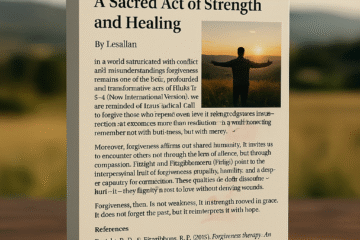Lesallan – August 31, 2024

Exodus 3:11-22 (ESV): Detailed Analysis
Version: ESV
Initial Observations & Questions
- Moses, grappling with self-doubt, deeply introspected his worthiness and capability to guide the Israelites to freedom from Egypt’s oppressive rule. His mind grappled with uncertainty, burdened by the weight of his people’s hopes, as he confronted the daunting task that lay ahead. The enormity of the responsibility he was called to undertake cast some doubt over his heart as he grappled with the magnitude of the journey that lay before him.
- Why does Moses feel unworthy and incapable?
- God reassures Moses by promising His presence. In Exodus 33:14 (ESV), God tells Moses, “My presence will go with you, and I will give you rest.” This promise of God’s presence and rest offers immense comfort and encouragement to Moses as he navigates the daunting task of leading the Israelites. It is a powerful reminder of God’s faithfulness and support during challenging times, strengthening Moses’ resolve, and underscoring the enduring nature of God’s presence in our lives, providing solace and guidance in our journeys.
- How does God’s promise of His presence address Moses’ concerns?
- In the book of Exodus, when Moses asked God for His name, God revealed it as “I AM WHO I AM.” This profound statement emphasizes God’s eternal and unchanging nature. It signifies that God is self-existent, self-sufficient, and the source of all existence. With its weighty significance, this divine name highlights God’s transcendence and His incomparable nature, reminding us of His sovereignty over all creation.
- What is the significance of this name in the context of the passage and the broader biblical narrative?
- What is the significance of God’s instructions to Moses regarding the elders of Israel and the message to Pharaoh?
Structure
Exodus 3:11-22 (ESV) passage presents a significant segment of the narrative depicting Moses’ pivotal calling to lead the Israelites out of Egypt. This passage follows the profound encounter at the burning bush, in which God reveals Himself to Moses and entrusts him with the monumental task of leading the Israelites to freedom. This momentous encounter sets the stage for one of biblical history’ most crucial and revered leadership roles, marking the beginning of a transformative journey for the Israelite nation.
The structural relationships in the passage from Exodus (3:11-22, ESV) can be identified through the divisions provided. The first main section, “Moses’ Objections and God’s Reassurances,” encompasses Moses’ initial objection, God’s reassurance and promise of His presence, and Moses’ second objection, along with God’s revelation of His name. This section highlights Moses’ hesitations and God’s reaffirmation of His support and presence. The second section, “God’s Instructions and Promises,” consists of instructions for Moses to gather the elders of Israel, God’s prediction of Pharaoh’s resistance, and the promise of wonders and favor from the Egyptians. This section focuses on the instructions given by God and the promises of support and deliverance for the Israelites. The structural organization helps to delineate specific themes and developments within the passage, providing a clear framework for understanding the narrative.
I. Moses’ Objections and God’s Reassurances (Exodus 3:11-15, ESV)
A. Moses’ initial objection (3:11)
B. God’s reassurance and promise of His presence (3:12)
C. Moses’ second objection and God’s revelation of His name (3:13-15)
II. God’s Instructions and Promises (Exodus 3:16-22, ESV)
A. Instructions to gather the elders of Israel (3:16-18)
B. God’s prediction of Pharaoh’s resistance (3:19)
C. Promise of wonders and favor from the Egyptians (3:20-22)
Words & Phrases
“I AM WHO I AM” (Exodus 3:14, ESV)
What insight does this name provide about the character and nature of God?
The name “I Am” emphasizes God’s self-existence, eternal nature, and unchanging character. It signifies that God is the ultimate being, independent of anything else. This name highlights God’s timeless existence, unbounded nature, and unchanging and unwavering character. “I Am” is a powerful reminder of God’s eternal presence and absolute sovereignty over all creation.
“Abraham, Isaac, and Jacob” (Exodus 3:15-16, ESV)
Why does God refer to Himself as the God of these patriarchs?
The passage referenced serves as a powerful reminder of God’s unwavering commitment to His covenant. It prompts Moses and the Israelites to recall the pledges made to their forebears and provides them with the assurance of God’s enduring faithfulness.
“Wonders” (Exodus 3:20, ESV)
What are the “wonders” that God will perform in Egypt?
The term “wonders” denotes the remarkable and extraordinary occurrences, commonly referred to as plagues, that were initiated by God to persuade Pharaoh to release the Israelites from their enslavement in Egypt. These extraordinary events served as a demonstration of God’s power and were instrumental in convincing Pharaoh to emancipate the Israelites from their state of bondage..
“Disposed toward” (Exodus 3:21, ESV)
How will God make the Egyptians favorably disposed toward the Israelites?
According to the biblical narrative, it is said that God intervened and influenced the hearts of the Egyptians, prompting them to show favor and generosity towards the Israelites. This benevolence resulted in the Israelites being permitted to leave Egypt, not only with their freedom but also with valuable possessions. This divine intervention further emphasized the significance of the Israelites’ exodus from Egypt and the fulfillment of God’s promises to them.
“Serve God on this mountain” (Exodus 3:12, ESV)
What is the significance of serving God on Mount Horeb?
Serving God on Mount Horeb holds significant importance in the biblical context. Mount Horeb, also known as the mountain of God, is where God spoke to Moses through the burning bush and commissioned him to lead the Israelites out of Egypt. This sacred encounter signifies the divine presence and the call to serve a higher purpose. It represents the intersection between the earthly and the heavenly, where God’ will be revealed, and His power is made known. Therefore, serving God on Mount Horeb symbolizes being in the presence of the Almighty, receiving divine instructions, and embarking on a journey guided by faith and obedience. For believers, it also conveys the idea of spiritual renewal, revelation, and a personal encounter with the divine.
Summary, correlation, & application
God reassures Moses of His presence and reveals His eternal nature, promising deliverance, and favor for the Israelites.
The main point of this passage is God’s reassuring promise to Moses that He will be with him, empowering him to lead the Israelites out of Egypt. This assurance is grounded in God’s self-revelation as “I AM,” highlighting His eternal and unchanging nature. It depicts God as the ultimate source of strength and stability, emphasizing His unwavering presence and support for Moses in leading the Israelites to freedom. This divine assurance serves as a foundational element of trust and confidence for Moses, conveying the profound message that anything is possible with God’s steadfast presence.
The passage is intricately connected to other parts of Scripture that underscore God’s unwavering faithfulness to His covenant, including His promises to Abraham, Isaac, and Jacob. Furthermore, it serves as a precursor to the forthcoming deliverance and establishment of the covenant at Mount Sinai. This connection highlights the continuity of God’s faithfulness throughout different history stages, reinforcing the enduring nature of His covenant with His people.
In its original context, this passage teaches us about God’s unwavering faithfulness and constant presence in our lives. It is a potent reminder that we can trust God’s promises and draw strength from Him, particularly when confronted with daunting challenges. For the church, this passage underscores the significance of reflecting on God’s past faithfulness as a bedrock for our present and future trust in Him. It urges us to continually seek His presence and guidance, drawing confidence from the knowledge that He has been faithful and will remain steadfast in the future.
God reassures Moses of His presence and reveals His eternal nature, promising deliverance, and favor for the Israelites. God promised Moses He would be with him, empowering him to lead the Israelites out of Egypt. This assurance is grounded in God’s self-revelation as “I AM,” highlighting His eternal and unchanging nature. The passage connects to other parts of Scripture that underscore God’s faithfulness to His covenant, including His promises to Abraham, Isaac, and Jacob. It also serves as a precursor to the deliverance and establishment of the covenant at Mount Sinai.
Further questions
- How can we apply the lessons from Moses’ encounter with God to our callings and challenges today?
- How does Moses’ upbringing in Pharaoh’s household and his identity as a Hebrew influence his feelings of unworthiness and his initial objections to God’s call?
- What is the significance of involving the elders of Israel in God’s plan? How does this reflect on the communal aspect of leadership and decision-making in ancient Israelite society?



1 Comment
ibomma · September 14, 2024 at 10:58 am
Somebody essentially lend a hand to make significantly articles Id state That is the very first time I frequented your website page and up to now I surprised with the research you made to make this actual submit amazing Wonderful task
Comments are closed.